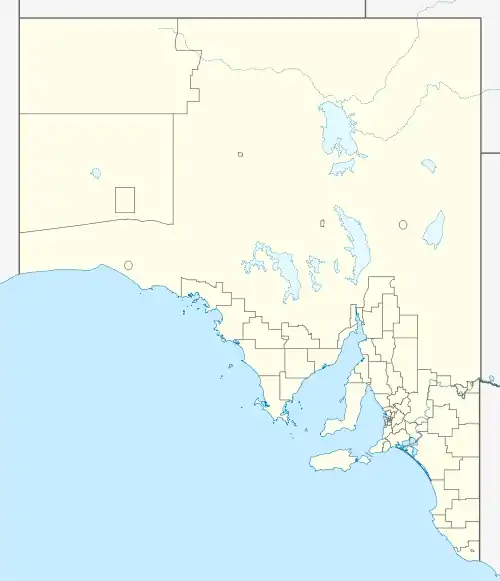Port MacDonnell, South Australia
Port MacDonnell, originally known as Ngaranga[10][11] is the southernmost town in South Australia. The small port located on the Great Australian Bight in the Limestone Coast region about 477 kilometres (296 mi) southeast of Adelaide and 28 kilometres (17 mi) south of Mount Gambier in the District Council of Grant local government area. The 2016 Australian census which was conducted in August 2016 reports that the locality of Port MacDonnell had a population of 847 of which 671 lived in its town centre.[2][3] Once a busy shipping port, the town now relies heavily on its fishing and summer tourism industries, particularly rock lobster harvest industry, proclaiming itself "Australia's Southern Rock Lobster Capital".[12]
| Port MacDonnell South Australia | |||||||||||||||
|---|---|---|---|---|---|---|---|---|---|---|---|---|---|---|---|
 View West to Port Macdonnell from Racecourse Bay | |||||||||||||||
 Port MacDonnell | |||||||||||||||
| Coordinates | 38°03′0″S 140°41′0″E[1] | ||||||||||||||
| Population |
| ||||||||||||||
| Established | 1860 (town) 31 October 1996 (locality)[1][4] | ||||||||||||||
| Postcode(s) | 5291[5] | ||||||||||||||
| Location |
| ||||||||||||||
| LGA(s) | District Council of Grant[1] | ||||||||||||||
| Region | Limestone Coast[6] | ||||||||||||||
| County | Grey[1] | ||||||||||||||
| State electorate(s) | Mount Gambier [7] | ||||||||||||||
| Federal Division(s) | Barker[8] | ||||||||||||||
| |||||||||||||||
| |||||||||||||||
| Footnotes | Locations[5] Climate[9] Adjoining localities[1] | ||||||||||||||
History
The area was originally inhabited by the Bungandidj Aborigines, who referred to it as Ngaranga, possibly meaning "noisy" or "caves".[11] Their oral history recorded that the dry land previously extended southwards from this area, before it was flooded.[10]
The first Europeans to see the area were led by explorer Lieutenant James Grant in HMS Lady Nelson on 3 December 1800.[13] In 1860 the area was proclaimed an official port, was given a name, and was surveyed. It is named after Sir Richard Graves MacDonnell who was Governor of South Australia from 1855 to 1862.[14]
In the 1880s, it was one of Australia's busiest ports, shipping large quantities of wheat and wool to Europe.
The port was, however, exposed to the weather and the site of many shipwrecks.[15] Across the border in Portland, Victoria, 85 km southeast, is a much more sheltered port.
The following have been listed as state heritage places on the South Australian Heritage Register – the Cape Northumberland Lighthouse, the Dingley Dell Museum and the Former Port MacDonnell customs house.[16][17][18]
Geography
The town of Port MacDonnell is set on flat swampy land in a bay between rocky capes of spectacular wave eroded formations the most spectacular being those to the near west at Cape Northumberland. The port's harbour itself is formed by a large artificially constructed rock breakwater, while the coastline is sandy beaches and rock outcrops providing shelter to the port from the rough seas. The rock provides substantial habitat for the southern rock lobster which is the town's main industry and colonies of little penguin.
Lighthouse
Cape Northumberland has a prominent lighthouse which dates to 1882. An earlier 1858 lighthouse was the first in South Australia however was demolished after it was in danger of collapse. A monument marks the site.[19]
Governance
Port MacDonnell is located within the federal division of Barker, the state electoral district of Mount Gambier and the local government area of the District Council of Grant.[8][7][1]
See also
References
- "Search results for 'Port MacDonnell, LOCB' with the following datasets being selected - 'Suburbs and Localities', 'Counties', "Government towns','Local Government Areas', 'SA Government Regions' and 'Gazetteer'". Location SA Map Viewer. Government of South Australia. Retrieved 19 April 2018.
- Australian Bureau of Statistics (27 June 2017). "Port MacDonnell (Urban centre)". 2016 Census QuickStats. Retrieved 19 April 2018.

- Australian Bureau of Statistics (27 June 2017). "Port MacDonnell (locality)". 2016 Census QuickStats. Retrieved 19 April 2018.

- Kentish, P.M. (31 October 1996), "GEOGRAPHICAL NAMES ACT 1991, Notice to Assign Boundaries and Names to Places" (PDF), The South Australian Government Gazette: 1517, retrieved 19 April 2018
- "Postcode for Port Macdonnell, South Australia". postcodes-australia.com. Retrieved 21 August 2016.
- "Limestone Coast SA Government region" (PDF). The Government of South Australia. Retrieved 1 November 2016.
- "District of Mount Gambier Background Profile". Electoral Commission SA. Retrieved 28 March 2016.
- "Federal electoral division of Barker" (PDF). Australian Electoral Commission. Retrieved 28 March 2016.
- "Monthly climate statistics: Summary statistics Mount Gambier Aero (nearest weather station)". Commonwealth of Australia, Bureau of Meteorology. Retrieved 17 August 2016.
- Christina Smith, The Booandik Tribe of South Australian Aborigines: A Sketch of Their Habits, Customs, Legends, and Language, Spiller, 1880
- Blake, Barry J. (2003). The Bunganditj (Buwandik) language of the Mount Gambier region. Australian National University. Research School of Pacific and Asian Studies. Canberra: Pacific Linguistics, Research School of Pacific and Asian Studies, Australian National University. ISBN 9780858834958. OCLC 56054287.
- http://portmacdonnell.sa.au/
- "Port MacDonnell". Walkabout. Fairfax Digital. Archived from the original on 27 August 2006. Retrieved 27 July 2006.
- "Port MacDonnell". Place Names Online. Government of South Australia. Archived from the original on 30 September 2007. Retrieved 27 July 2006.
- "SHIPWRECK LANE". The Morning Bulletin. Rockhampton, Qld. 20 December 1940. p. 10. Retrieved 23 November 2013 – via National Library of Australia.
- "Cape Northumberland Lighthouse". South Australian Heritage Register. Department of Environment, Water and Natural Resources. Retrieved 20 August 2016.
- "Dingley Dell Museum". South Australian Heritage Register. Department of Environment, Water and Natural Resources. Retrieved 19 August 2016.
- "'The Customs House' (former Port MacDonnell Customs House, Courthouse, Telegraph Station and Police Station)". South Australian Heritage Register. Department of Environment, Water and Natural Resources. Retrieved 12 May 2017.
- http://www.lighthouse.net.au/lights/sa/Cape%20Northumberland/Cape%20Northumberland.htm#History